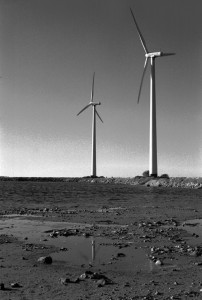The Danes have an enduring relationship with wind. This is symbolized by the big, honking wind turbine that looms like a bird of prey over the parking lot outside the Bella Center, the venue for the U.N. Climate Change Conference Denmark is hosting in December.
It was a Dane, physicist H.C. Oersted, who discovered electrical induction, the principle at work inside wind and other electric generators. Danish farmers brag they were the first in the world to generate electricity from wind.
The Danes are now hard at work cracking one of the great challenges of wind power: the fact that the wind blows when it darn well pleases. Sometimes it blows hard when there isn’t much need for the resulting electricity. Sometimes the air is becalmed when electricity is needed the most.
Wouldn’t it be nice if households in Denmark had nice batteries to store the wind power coming off the country’s wind farms?
Denmark’s plan is to get those batteries into households using a Trojan horse strategy. The batteries will be mounted on four tires. If lots of Danish people switch from gasoline cars to all-electric plug in cars, each of those cars will have a nice set of batteries that can suck in wind power when the wind blows and use the power whenever there is a need to drive somewhere.
If this tactic of sneaking batteries disguised as new cars into Danish garages is to work, the electric car has to become a mass market item. For that, two big things have to happen. First, electric cars have to be capable of driving longer distances. To do that, a California company, Better Place, has come up with pit stops equipped with robots that will quickly swap out depleted batteries for charged ones.
Second, for electric cars to become widespread, they need to be comparatively cheap. The Danish government is pulling that off by making new electric cars exempt from a huge (180 percent!) environmental tax that applies to gas cars.
If all goes well, Danish roads could be swarming with mainly Renault-Nissan electric cars in a couple of years (Better Place has a strategic partnership with the carmaker). If all goes especially well, Denmark could eventually end the import of oil, courtesy of the wind.
Watch David Brancaccio’s report on Green Denmark — airing this week on PBS stations nationwide (schedule).


